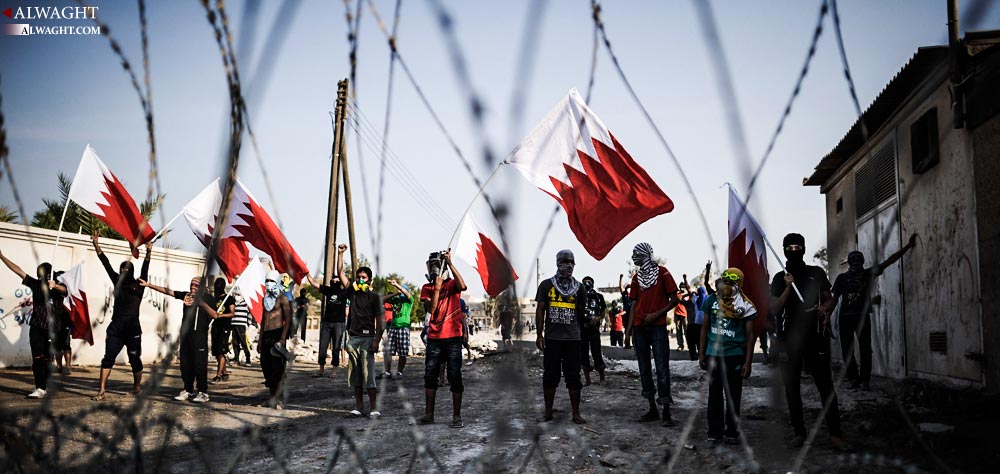Alwaght- In 2011, the Bahraini King Hamad bin Isa Al Khalifa faced rise of popular protests calling for political and economic reforms across the tiny island kingdom. Since their eruption, the demonstrations went on without the protestors resorting to armed conflict with the government, instead they continued their peaceful rallies, struggling to make their voice heard by the Manama rulers.
For the political parties and movements, the protests were of popular and comprehensive nature, with the young people accounting for the majority of organizers of the rallies. A majority of the demonstrators are Shiite Muslims, however, other factions and faiths including the Sunnis, liberals, and the leftists have been sharing their voice with the anti-regime demonstrations.
The activists since the beginning underscored peacefulness of their movement, declining to seek armed clashes with the regime and are emphasizing on the fact now that the uprising is turning six.
But the demonstrators' restraint did not make the Al Khalifa act reciprocally. It responded to the peaceful protest movement using securitization strategy, the aim behind which was to turn the demonstrations erosive and so consume energy of the opposition on the one hand and seek content of the pro-Khalifa US and some regional sides on the other hand.
Along with labelling the protests as sectarian activities being used instrumentally to build ground for Shiites to enter regime’s structures, Al Khalifa accused the opposition of receiving support from Iran, claiming that the Shiite leaders, including Sheikh Isa Qassim, were in close contact with Tehran officials.
The Manama accusing Tehran of interventions in its domestic affairs came while the prominent Bahraini lawyer Cherif Bassiouni, the head of Bahrain Independent Commission of Inquiry, a body established to provide reports on the uprising incidents in the country, in his statement emphasized that his report handed in to the commission did not find evidences substantiating any links between Bahrain incidents and any Iranian role, adding that claims of Tehran interventions in the protest moves were totally baseless.
The Iranian officials, on the other side, denied claims that they had role in spark of Bahraini people’s protests and their continuation to date, noting that the anti-regime demonstrations demanded consideration of political and social rights and any government resistance to them and use of force to address them may upgrade them to more violent levels.
But Al Khalifa regime has continued pressures and accusations in a bid to repress the pro-democracy rallies and pave the way for Sheikh Isa Qassim's trial that has so far been postponed four times as the domestic pressures have mounted on the Manama leaders.
The (Persian) Gulf Cooperation Council, a six-nation Arab bloc dominated by Saudi Arabia, in solidarity with the Al Khalifa regime has gone to great lengths to display the Bahrain’s developments as Iran’s aggressive regional action directed against the conservative Arab camp. The Council meant to build sympathetic international atmosphere to file a complaint against Iran to the United Nations Security Council.
Short after outbreak of the Bahrain’s popular protests in 2011, the Council deployed to Bahrain 1,000 Saudi Arabian and 500 Emirati troops under the terms of the Peninsula Shield Forces which was established to react to foreign threats posed to the bloc’s member states. The number of foreign troops hit 5,000 gradually over the course six years of the revolution.
The troops deployment to Bahrain saw an increase especially after Riyadh-backed terrorist groups in Syria and Iraq lost their ground in clashes with these countries' national forces. In fact, Saudi Arabia is worried that after Syria and Iraq successes against the terrorists– which largely happen on the strength of Iran support– Bahraini people’s success in their uprising will expand Tehran’s influence regionally.
Associating the Bahrain’s protests with the so-called Iranian expansionist plans in West Asia could arouse sympathy of the global powers, particularly the US's, to help Manama leaders to provide legal covers for their attempts to curb waves of pro-reform demonstrations. The US main approach in response to the Bahraini people’s protests is propping up the Al Khalifa regime, because Bahrain is home to the US Fifth Naval Fleet. Additionally, after US forces withdrawal from Iraq in 2011, Bahrain stood candidate to provide Washington with a significant regional platform for continuation of strategic American policies in the region. So efforts to provoke the American leaders against Iran’s regional role and influence expansion can urge Washington to intervene in Bahrain’s crisis.
Pursuing its longstanding policy in dealing with the uprising, the Bahraini interior ministry recently published a statement, repeating its earlier accusations against Iran. The statement alleged that the Bahraini authorities arrested members of a terrorist group linked to Iran's Islamic Revolutionary Guards Corps (IRGC). The police released images of the group members, claiming that 11 of 14 of the arrested individuals had been trained by the IRGC as well as Kata’ib Hezbollah, an Iraqi paramilitary group established in opposition to ISIS terrorist organization. Tehran has strongly denied that the accusations were veracious.
The deadlock marked by ongoing anti-regime demonstrations and failure to deal with the outspoken Sheikh Isa Qassim displays the outlook of the anti-Iranian policy which is regularly followed by Manama leaders in league with some (Persian) Gulf Cooperation Council rulers to cover up their abuses against the opposition body in Bahrain.



























